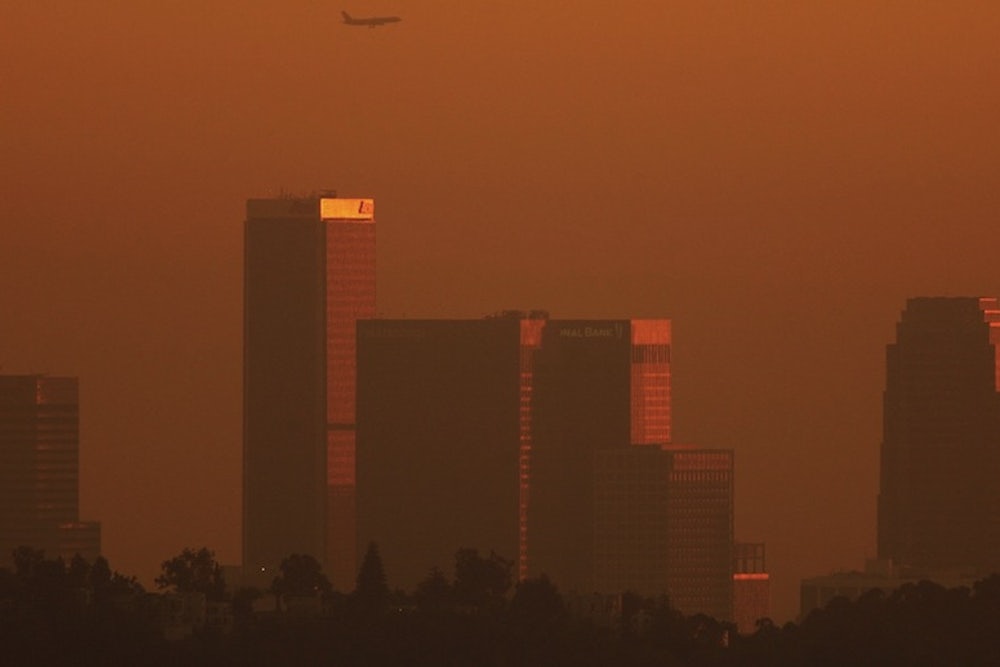A big new report on climate change published on Tuesday got lots of attention—and deservedly so. The National Climate Assessment, which hundreds of scientists helped put together, warns that the effects of global warming aren’t some far-off possibility. They are happening right now, here in the U.S. Those effects include all the familiar problems: drought, wildfires, extreme weather, and sea level rise. But they include something else: Threats to public health.
As the document notes. “When asked about climate change impacts, Americans do not mention health impacts, and when asked about health impacts specifically, most believe it will affect people in a different time or place.” That’s not true. The health impacts are happening already, all over the country. Here are six ways:
1. Allergies and asthma: Climate change plays a few roles contributing to asthma: It lengthens allergy season and raises pollen counts. An increase in ozone and carbon pollution contributes to pollen counts, while extreme rainfall and dampness encourages the growth of indoor fungi and molds. The result? Terrible allergy seasons and more cases of asthma: The rate of people diagnosed with asthma has gone up from 7.3 percent of the population to 8.4 percent over the last decade. Between 1995 and 2011, hotter temperatures caused the ragweed pollen season to increase by anywhere from 11 to 27 days in parts of the U.S.

2. Lungs and heart: One way climate change causes lung damage is through the spread of wildfires, the report explains. A warmer, drier climate is linked to record-breaking wildfires, which have come dangerously close to threatening populated cities like San Francisco and Colorado Springs. Air pollution and smog also directly impair the lungs, and some studies liken breathing ground-level ozone and tiny particulate matter to inhaling second-hand cigarette smoke. Last year, the World Health Organization declared air pollution to be a carcinogen, saying its link to lung cancer is clear and that it's also associated with an increased risk for bladder cancer.

3. Stroke from heat waves. Imagine the hottest days that the country experienced over the last two decades. Now imagine them 10 to 15 degrees hotter. Climate change means the deadly summer heat waves will only grow worse. For instance, 2013 was tied for the fourth-hottest year for the United States while 2012 was the hottest ever recorded across the country. Record heat causes problems for the heart, lungs, and kidneys, especially in the elderly and sick, and while solutions like air conditioning can reduce some of these risks it still leaves the poor vulnerable. People who don’t believe in climate change—or think it’s no big deal—sometimes argue that warming temperatures will actually mean fewer deaths, since winter-related mortality will decline. The report puts that claim to rest: “these reductions are not expected to compensate for the increase in heat-related deaths.”
4. Food illnesses: Warming, along with changed weather patterns, creates a perfect environment for bacteria like salmonella and cholera to contaminate food and water. Heavy rain, flooding, and rapid snowmelt can lead to water contamination from sewage, chemicals, and pollutants. According to the National Climate Assessment, the Great Lakes region is expected to face more risk of exposure to these threats due to climate change. That was the situation that played out during the heavy flooding that hit Colorado last fall, where the water was discovered to contain elevated levels of e. coli.
5. Insect-carried diseases like Lyme, West Nile virus: Ticks and mosquitoes help spread diseases, and they thrive in habitats with hotter temperatures, heavy precipitation, and humidity. According to the national assessment, “confidence is high based on scientific literature that climate change has contributed to the expanded range of certain disease vectors, including ticks which are vectors for Lyme disease in the United States.” Because of milder winters, these insects can enjoy a longer season to transmit the diseases, too.
6. Mental health: Yes, really. The people affected by Hurricane Katrina experienced high levels of stress and even post-traumatic stress disorder. A body of research has also linked the mental stress from flooding, wildfires, heat waves, and extreme weather to child development problems, including lower birth weights and pregnancy complications. The stress from these impacts typically hurt people already suffering the most from mental illness. When temperatures rise, so do suicide rates, a problem researchers expect to only grow worse as it gets hotter.
